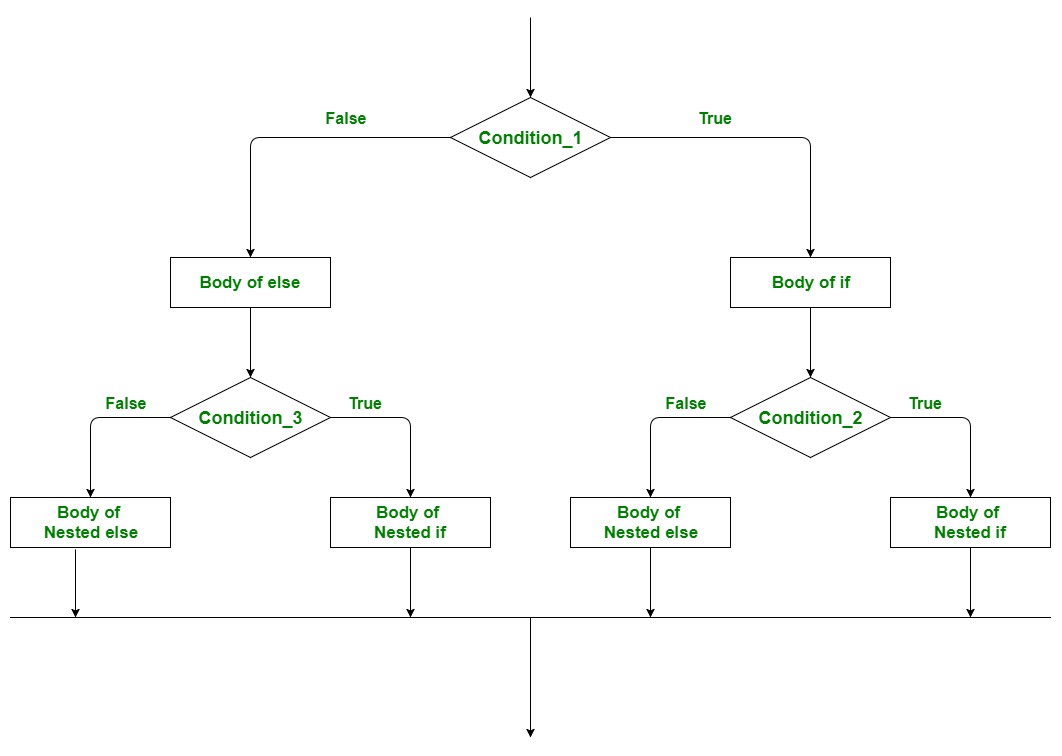Scala | Decision Making (if, if-else, Nested if-else, if-else if)
Last Updated :
04 Jul, 2019
Decision making in programming is similar to decision making in real life. In decision making, a piece of code is executed when the given condition is fulfilled. Sometimes these are also termed as the Control flow statements. Scala uses control statements to control the flow of execution of the program based on certain conditions. These are used to cause the flow of execution to advance and branch based on changes to the state of a program.
The conditional statements of Scala are:
- if
- if-else
- Nested if-else
- if-else if ladder
if statement
“if” statement is the simplest decision making statements among all decision making statements. In this statement, the block of code is executed only when the given condition is true and if the condition is false then that block of code will not execute.
Syntax:
if(condition)
{
// Code to be executed
}
Here, condition after evaluation will be either true or false. if statement accepts boolean values – if the value is true then it will execute the block of statements under it.
If we do not provide the curly braces ‘{‘ and ‘}’ after if(condition) then by default if statement will consider the immediate one statement to be inside its block.
Example:
if(condition)
statement1;
statement2;
// Here if the condition is true, if block
// will consider only statement1 to be inside
// its block.
Flow Chart:

Example:
object Test {
def main(args: Array[String]) {
var a: Int = 50
if (a > 30)
{
println("GeeksforGeeks")
}
}
}
|
Output:
GeeksforGeeks
if-else statement
The if statement alone tells us that if a condition is true it will execute a block of statements and if the condition is false it won’t. But what if we want to do something else if the condition is false. Here comes the else statement. We can use the else statement with if statement to execute a block of code when the condition is false.
Syntax:
if (condition)
{
// Executes this block if
// condition is true
}
else
{
// Executes this block if
// condition is false
}
Flow Chart:

Example:
object Test {
def main(args: Array[String]) {
var a: Int = 650
if (a > 698)
{
println("GeeksforGeeks")
}
else
{
println("Sudo Placement")
}
}
}
|
Output:
Sudo Placement
Nested if-else statement
A nested if is an if statement that is the target of another if-else statement. Nested if-else statement means an if-else statement inside an if statement or in a else statement. Scala allows us to nest if-else statements within if-else statement.
Syntax:
// Executes when condition_1 is true
if (condition_1)
{
if (condition_2)
{
// Executes when condition_2 is true
}
else
{
// Executes when condition_2 is false
}
}
// Executes when condition_1 is false
else
{
if (condition_3)
{
// Executes when condition_3 is true
}
else
{
// Executes when condition_3 is false
}
}
Flow Chart:

Example:
object Test {
def main(args: Array[String]) {
var a: Int = 70
var b: Int = 40
var c: Int = 100
if (a > b)
{
if(a > c)
{
println("a is largest");
}
else
{
println("c is largest")
}
}
else
{
if(b > c)
{
println("b is largest")
}
else
{
println("c is largest")
}
}
}
}
|
Output:
c is largest
if-else if Ladder
Here, a user can decide among multiple options. The if statements are executed from the top down. As soon as one of the conditions controlling the if is true, the statement associated with that if is executed, and the rest of the ladder is bypassed. If none of the conditions is true, then the final else statement will be executed.
Syntax:
if(condition_1)
{
// this block will execute
// when condition_1 is true
}
else if(condition_2)
{
// this block will execute
// when condition2 is true
}
.
.
.
else
{
// this block will execute when none
// of the condition is true
}
Flow Chart:

Example:
object Test {
def main(args: Array[String]) {
var value: Int = 50
if (value == 20)
{
println("Value is 20")
}
else if (value == 25)
{
println("Value is 25")
}
else if (value == 40)
{
println("Value is 40")
}
else
{
println("No Match Found")
}
}
}
|
Output:
No Match Found
Share your thoughts in the comments
Please Login to comment...